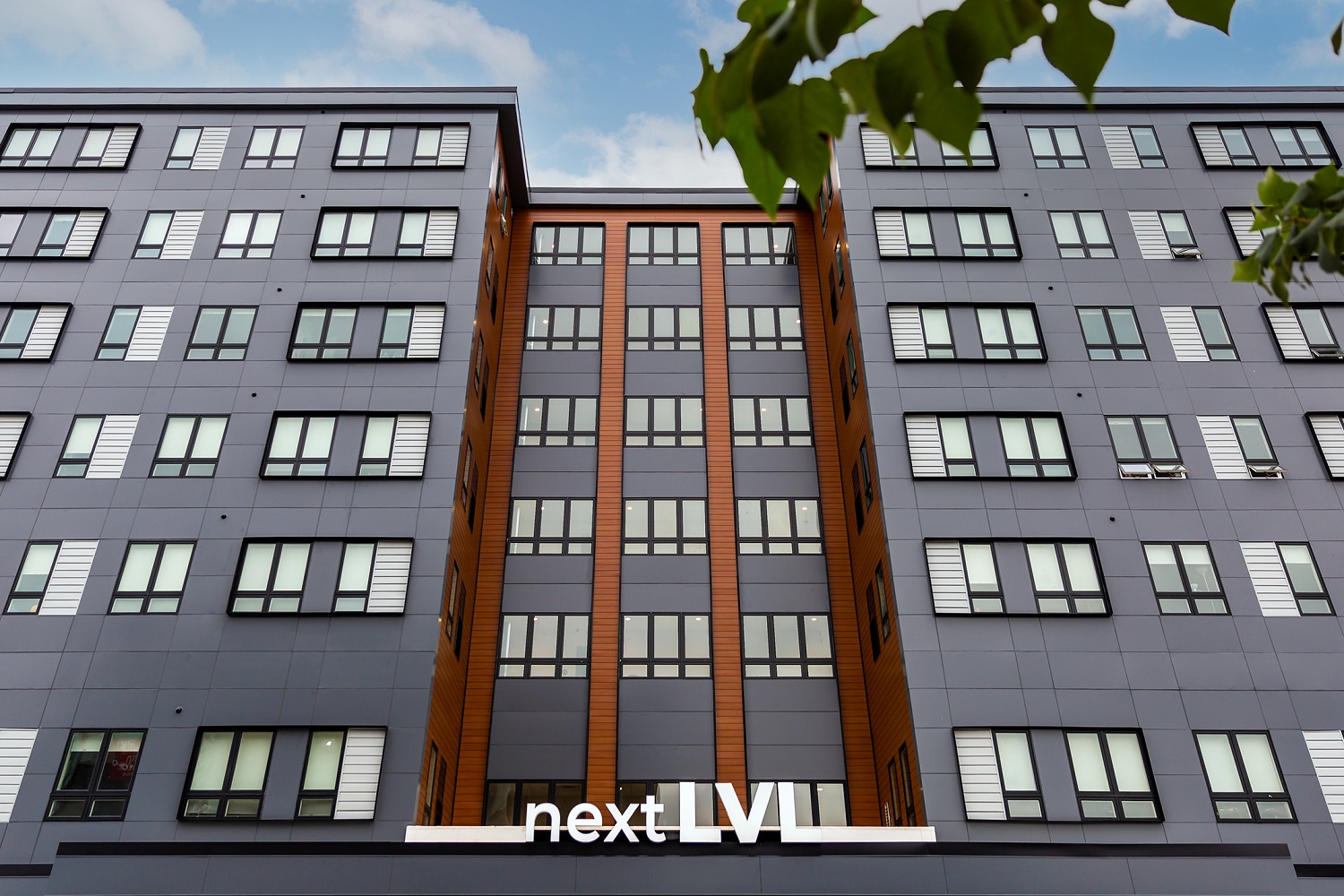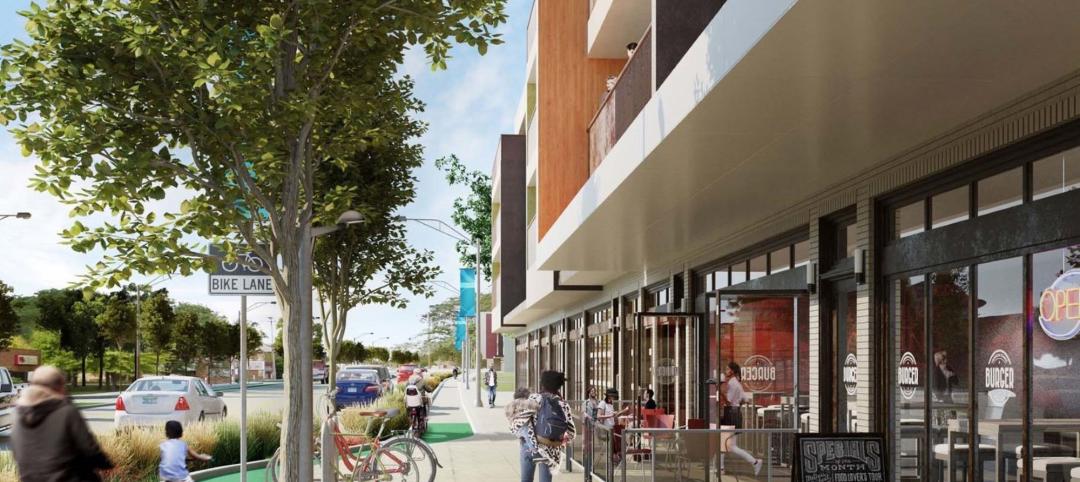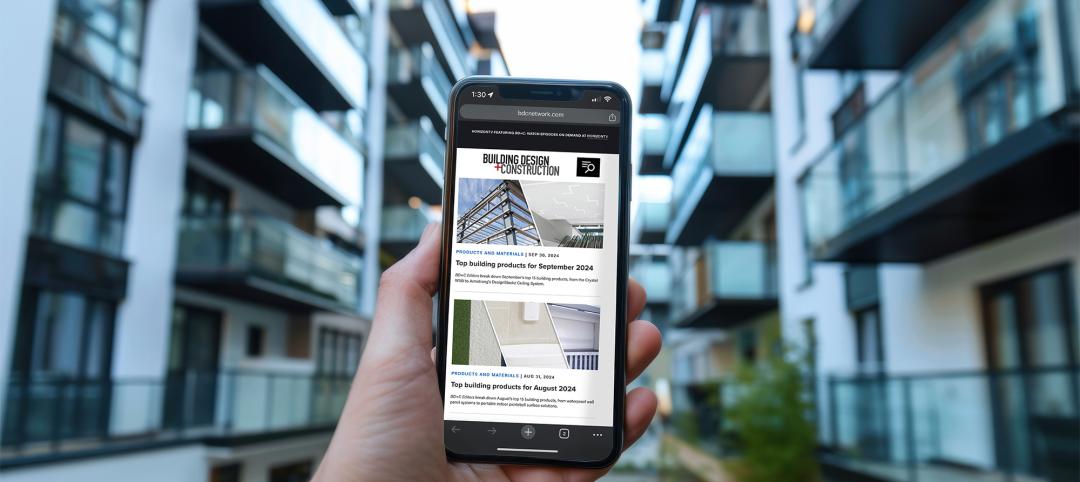Tight space and time constraints are common for multifamily projects in high-density urban areas. To combat these challenges, Philadelphia-based VBC has made a name for itself by offering a modular solution. While designing Next LVL, a multifamily residence in the heart of the city, the VBC team discovered that MagicPak All-In-One™ HVAC Systems could help achieve each of the project’s major objectives, including more living space, faster occupancy and highly desirable rooftop gathering spaces.
Compared to traditional methods, using MagicPak® helped shave off two months of labor, while meeting the architect’s aesthetic vision for the building exterior. By eliminating outdoor equipment, Next LVL could offer more of the in-demand features that help attract and retain tenants, including an expansive rooftop lounge with greenspace and unobstructed views of the city.
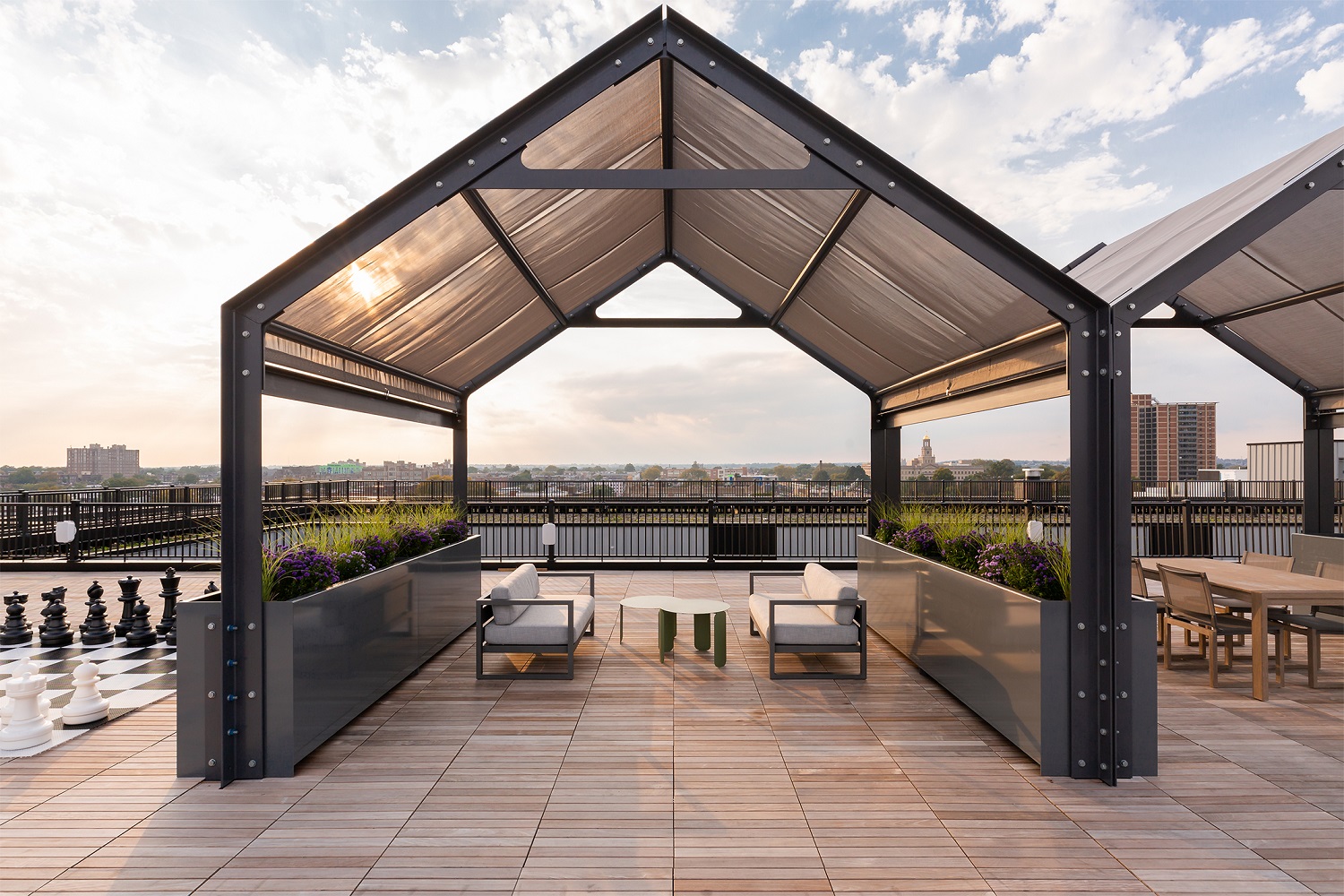
Optimized Space and Amenities
With space at a premium, VBC wanted to fit as many units as possible into the building footprint. MagicPak eliminated the need to run vertical line sets throughout the building, meaning square footage traditionally needed for chaseways could be used for hallways or living units. It also simplified the overall design process.
“We don’t have to worry about line sets running into fire sprinkler lines and all of the other things that we have running through a complex system,” said Sara-Ann Logan, vice president of design at VBC.
Using the MagicPak system also had another major benefit: keeping 280 condensing units off the roof.
“When you’re in a city environment and every inch counts, you really don’t want to waste space by putting condensers in places that could otherwise be livable space or provide some sort of amenity to the tenants,” said Logan.
With no HVAC equipment on the roof, that space was now available for highly desirable (and potentially rent-boosting) amenities.
“In the city with very dense living, you always want to make sure that your tenants have the ability to connect to the outside,” Logan noted. “By choosing MagicPak, we unlocked the ability to use the space on the top floor and gave the tenants of this building a unique space that I think is one of the best in the city.”
As the project’s architect, Logan also pointed to the design flexibility afforded by MagicPak.
“I can align louvers with windows and really have the ability to design exterior features the way that I want to as an architect and the way honestly that the cities want us to,” said Logan. Working with MagicPak also allowed her to achieve the seamless aesthetic she was looking for by matching various exterior colors.
“In this particular project we have five to six exterior skin conditions,” said Logan. “Being able to match those and have those disappear with the exterior was critical, and it was really easy to do with the MagicPak system.”
Less Onsite Labor, Easier Maintenance
As a modular builder, VBC was already doing the bulk of its construction in the factory. With MagicPak, most of the HVAC work could also be done offsite under controlled conditions.
“It's a really unique system and it's very user-friendly for installation purposes,” said Robert Schmalbach, VBC vice president of construction.
The all-in-one units, duct work and thermostat were installed into each living unit in the factory, dramatically reducing the time needed for HVAC field teams onsite.
“When it comes to the site, all we need to do is commission that unit, turn it on and it works,” said Schmalbach. “By working with MagicPak on this project, we were able to basically limit the HVAC field teams, onsite component to roughly 30 days versus potentially 90 days if we had gone with a different type of system.”
The time-saving benefits extend beyond construction, making ongoing maintenance simpler and more convenient.
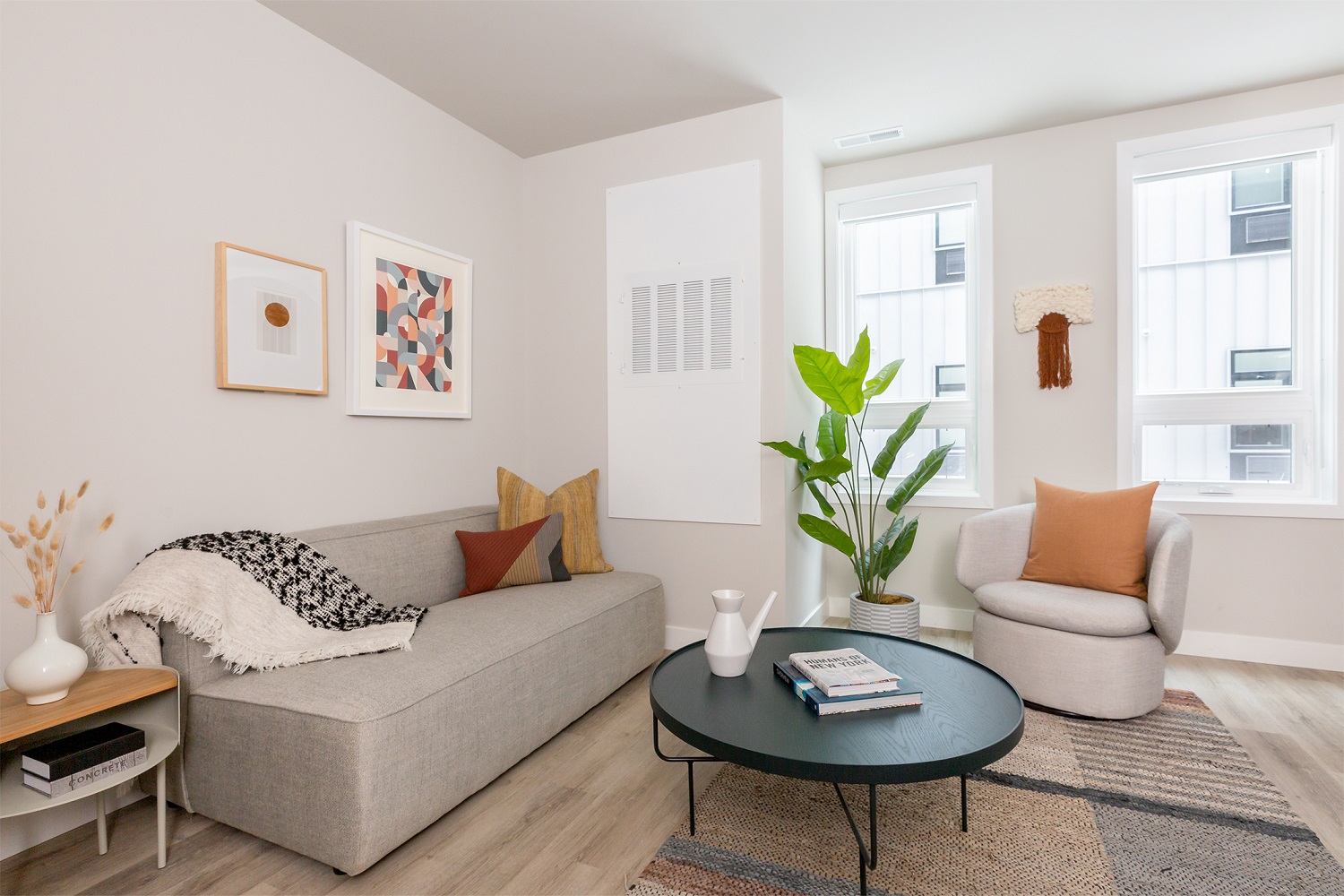
According to Schmalbach, MagicPak “extremely quiet and user-friendly.” And because it’s housed within an individual living unit, it’s protected from the elements and easy to service.
“The technician can simply go into that unit, observe what's going on and be able to fix it without having to either chase down a leak or go to multiple different areas, which potentially could have multiple different problems. For the developer, this really simplifies their systems and their warranty work and what they need to be prepared for.”
“With MagicPak, everything’s in front of me, I can easily access it all. And if worst case, if I have to pull the whole unit out, it’s doable in a safe environment.”
--
Contact Information
Phone: 1-800-448-5872
Email: MagicPakMarketing@alliedair.com
Website: www.magicpak.com
Related Stories
MFPRO+ New Projects | Oct 30, 2024
BIG’s One High Line finally reaches completion in New York City’s West Chelsea neighborhood
One High Line, a luxury residential project spanning a full city block in New York’s West Chelsea neighborhood, reached completion this summer following years of delays related to investor lawsuits.
MFPRO+ New Projects | Oct 30, 2024
Luxury waterfront tower in Brooklyn features East River and Manhattan skyline views
Leasing recently began for The Dupont, a 41-story luxury rental property along the Brooklyn, N.Y., waterfront. Located within the 22-acre Greenpoint Landing, where it overlooks the newly constructed Newtown Barge Park, the high-rise features East River and Manhattan skyline views along with 20,000 sf of indoor and outdoor communal space.
Multifamily Housing | Oct 28, 2024
A case for mid-rise: How multifamily housing can reshape our cities
Often referred to as “five-over-ones,” the mid-rise apartment type is typically comprised of five stories of apartments on top of a concrete “podium” of ground-floor retail. The main criticism of the “five-over-one” is that they are often too predictable.
Adaptive Reuse | Oct 22, 2024
Adaptive reuse project transforms 1840s-era mill building into rental housing
A recently opened multifamily property in Lawrence, Mass., is an adaptive reuse of an 1840s-era mill building. Stone Mill Lofts is one of the first all-electric mixed-income multifamily properties in Massachusetts. The all-electric building meets ambitious modern energy codes and stringent National Park Service historic preservation guidelines.
MFPRO+ News | Oct 22, 2024
Project financing tempers robust demand for multifamily housing
AEC Giants with multifamily practices report that the sector has been struggling over the past year, despite the high demand for housing, especially affordable products.
Products and Materials | Oct 17, 2024
5 multifamily tech products for your next project
Multifamily housing and technological upgrades go hand-in-hand. From the rise in electric vehicle charging needs to the sophistication of smart home accessories, tech products are abound in the multifamily space.
Codes and Standards | Oct 16, 2024
North Carolina’s code policies likely worsened damage caused by Hurricane Helene
The North Carolina Legislature’s rejection of building code updates likely worsened the damage caused by Hurricane Helene, code experts say. Over the past 15 years, lawmakers rejected limits on construction on steep slopes, which might have reduced the number of homes destroyed by landslides.
MFPRO+ News | Oct 16, 2024
One-third of young adults say hurricanes like Helene and Milton will impact where they choose to live
Nearly one-third of U.S. residents between 18 and 34 years old say they are reconsidering where they want to move after seeing the damage wrought by Hurricane Helene, according to a Redfin report. About 15% of those over age 35 echoed their younger cohort’s sentiment.
Student Housing | Oct 9, 2024
University of Maryland begins work on $148 million graduate student housing development
The University of Maryland, in partnership with Campus Apartments and Mosaic Development Partners, has broken ground on a $148.75 million graduate student housing project on the university’s flagship College Park campus. The project will add 741 beds in 465 fully furnished apartments.
MFPRO+ News | Oct 9, 2024
San Francisco unveils guidelines to streamline office-to-residential conversions
The San Francisco Department of Building Inspection announced a series of new building code guidelines clarifying adaptive reuse code provisions and exceptions for converting office-to-residential buildings. Developed in response to the Commercial to Residential Adaptive Reuse program established in July 2023, the guidelines aim to increase the viability of converting underutilized office buildings into housing by reducing regulatory barriers in specific zoning districts downtown.

